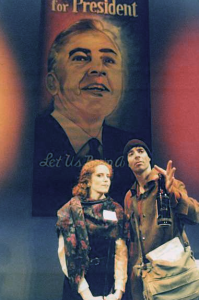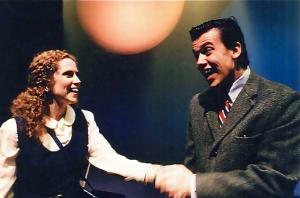Above: Amy Stiller and Sam Guncler; Amy Stiller and Timothy Karcher.
Full reviews
Star Ledger, Newark, NJ, Peter Filichia – After Wendy Wasserstein’s “The Heidi Chronicles” opened on Broadway in March 1989, it won the Pulitzer, Tony, Drama Critics Circle, Drama Desk, and Outer Critics Circle Awards. And yet, after it closed in September, 1990, it was seldom heard from again.
So let’s thank the new Two River Theatre Company of West Long Branch for reminding us what a wonderful and important play “The Heidi Chronicles” is.
It’s 1989, and Heidi Holland is a renowned art historian who’s delivering a lecture on obscure women painters of yore. One of the works reminds her of herself, and soon we’re flashbacked into her life. To that 1965 dance where she met handsome Peter. To that 1967 Eugene McCarthy political rally where she met the sardonic Scoop.
It wouldn’t be the last time that Heidi runs into these men. She’ll start an affair with one, though she’s more drawn to the other. But that one isn’t interested in her for a most compelling reason.
Still, she’ll forever stay friends with both. And friends with a good many women. Especially Susan, whom she meets in a consciousness-raising group. Wasserstein is pungent in her observations on how women friends treat – and should treat – each other.
Two River and director Beth Milles have delivered a very accomplished, all-Equity cast. Though Amy Stiller has been suffering from voice problems, she should have recovered by the time you attend this production – which, incidentally, you should. Even if she had no voice at all, her considerably eloquent Body English would carry the show. The way she bends her knees in swooning delight when meets handsome Peter. The manner in which she whirls her arms, clutching them around herself when she’s nervous, putting them akimbo when she’s angry, and flailing them when wearing a most dorky formal dress. And when she’s forced at a dance into doing the hully-gully, Stiller does it dully-dully.
More than that, though, Wasserstein’s script asks Heidi to do a great deal of reacting to all that’s happening around her, and Stiller does it with a most expressive face. Interesting that one of the slides projected on the back wall is a Doonesbury cartoon, for Stiller herself resembles that strip’s Joanie. But when she delivers a speech to a class at the high school from which she was graduated, Stiller can make the character’s glibness turn to genuine poignancy.
Sam Guncler plays the cocky Scoop as a man who isn’t as much full of himself as he is full of it. There he is, swigging his beer, using expansive gestures as he wields a cigar, perfectly content to be a wild and crazy groovy guy. He says outrageous things and still expects to be loved. Guncler has the pseudo-bored world-sorrow down pat, and deftly manages the scene where he must come to terms with his life.
T. Ryder Smith starts Peter as a man who has sideburns and all the answers. Watch him correct Heidi’s use of “girlfriends” to “women friends.” But the pretentiousness is carefully stripped away as the play continues, and Smith is up to the task of making the transition a smooth one. By the time he’s a pediatrician, he convinces you that he’s the type of doctor to which you’d like to take your kids. He’s also very moving in a speech about AIDS.
Alicia Sedwick is perfectly cast as the strong-faced Susan.The heavy- voiced actress can make a foghorn sound downright soprano. She’s very accomplished in the scene where she comes to terms with being superficial, and even has style in the way that she leans on a chair. Good work.
Three other women in the cast must play 10 roles. Kristen Lee Kelly is fine as a Generation X-rated TV assistant and a young woman who tries, in a losing battle, to make the absurd sound normal. Ashlee Temple is especially good as an effusive consciousness-raising hostess and a Southern belle who’s wrung out by marriage. Melinda Wade is excellent as a karate-chopping militant Lesbian, a magazine’s managing editor who wants to manage lives, a wedding guest from Montana, and, most memorably, an in-control TV host who’s just this side of parody, but never crosses the line.
No question that Baby Boomers are the ideal audience for “The Heidi Chronicles.” Remember the era of free love, Quaaludes, and the poster that proclaimed “Girls Say Yes to Boys Who Say No”? You’ll see all that here. You’ll also have the chance to hear some good songs from your salad days, including the mellifluous “Shoop Shoop Song” and Sam Cooke’s “You Send Me,” which is twice used to wonderful ironic purpose.
And yet, young director Milles belongs to Generation X, so if she can have such understanding and sensitivity with the material, other twenty-somethings may be as interested and amused to see what their forebears endured. Milles has kept matters slick – a necessity for a play that is admittedly very long. But one has to wonder why she had the men visibly age and Heidi look the same for the quarter-century span.
Two River’s last fine effort, “The Cocktail Hour,” played at the more intimate Guggenheim Theater at Monmouth University. For this production – and its upcoming “Misalliance” (May 11-21) – it will use the University’s Pollak Auditorium. It’s a bigger space – all the better to accommodate you, your family, and friends when you go to see this most impressive new company’s work. 4.4.95
[previous] [next]

